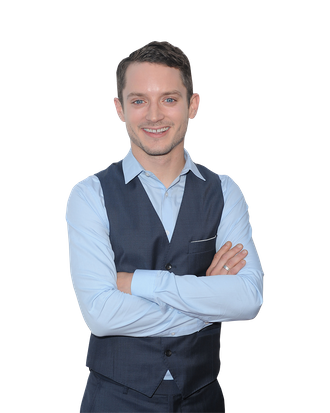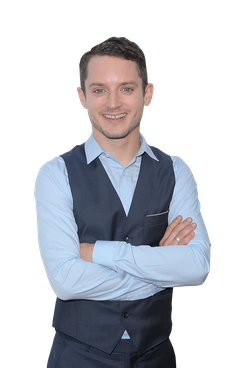

It’s been a very good year for Elijah Wood. His quirky new comedy Wilfred — where he plays the suicidal straight man to an Australian comedian in a dog suit — was an out-of-the-gate hit for FX in its series debut last week. What’s more, it’s bookended by two projects that Wood considers huge personal accomplishments: Earlier this year, he played a young Ad-Rock in the Beastie Boys short Fight for Your Right Revisited, and this fall, he’ll reprise his Lord of the Rings character Frodo for Peter Jackson’s upcoming two-part prequel The Hobbit. Wood sat down with us recently on the set of Wilfred to discuss his transition into television and his segue back into Middle-earth; here’s an extended version of the conversation that appeared in the magazine.
What scared you about doing Wilfred?
I think initially that it’d be as good as I’d hoped it would be, or that we’d collectively dreamed it to be. That was definitely a fear. Because I signed onto it after the pilot, I was in, but at that point we hadn’t gotten the scripts yet for the season. We didn’t get scripts for the season until February.
What kind of season commitment were you making, for how many seasons?
Thirteen episodes for five or six seasons? Whatever the standard is.
But you’re used to a long commitment, right?
Yeah, but television’s different. It could go for seven years. And I think my greatest concern is not really the measure of success for the show but its quality and its integrity. Because it’s such a unique show, there’s really nothing like it, and the most important thing for me is that it’s good, and that it remains good and interesting. And funny, yeah, but good. So that was a fear. I’m less fearful now. I really believe in it. I’m really excited by all the scripts that we’ve gotten, and every day I come to work I’m excited by what we’re doing. And we’ve been so lucky with our guest cast.
What is it like to be in virtually every scene in every single episode?
It’s great, it’s awesome. It’s so funny, I remember when we started and [the executive producer] was like, “Ten straight weeks, no hiatus. Get ready, it’s going to be tough.” Honestly, it has been intense, and I haven’t had a life. I kind of thought when we started — I hadn’t worked in Los Angeles in years — so I thought, Oh my God, this is amazing! We’re shooting it in LA, I’ll get to still be home, socialize with friends and family, and be working on this show. Brilliant! It hasn’t been that way at all. The show has completely taken over my life. I have just enough time to get home at night and work on tomorrow’s scenes and get enough sleep to get up the next day and work. But the process has been awesome, so much fun. And the pace of it is great. We’re always in it. there’s very little downtime, and I appreciate that. Sometimes downtime can make the day feel longer. I imagine that with comedy, it helps to work at a faster pace, to be in it a little bit more.
In addition to the show, you’re going to do The Hobbit, you were in that Beastie Boys short, and you turned 30 this year. Big stuff.
It’s funny, right? It’s a funny transition to make … I feel like my 29th year was in part getting ready to be 30, kind of accepting the fact that I was going to turn 30. But yeah, there’s something very surreal about it, turning 30. But the timing is kind of extraordinary in exactly the way you’re saying. To turn 30 and take this venture on the show, which is so unique, and I’ve never done a television show before, so everything’s brand-new and exciting and invigorating. Returning to Middle-earth twelve years after we started Rings is an amazing opportunity, a sort of family reunion. And the Beastie Boys short, to be asked to be a part of that and work with so many incredible actors and comedians was such an honor, not to mention to be directed by Adam Yauch, who’s just such a treat.
When do you go back to New Zealand to shoot The Hobbit?
October. I’m going to the U.K. first to do some shooting, but then I’m going down in October for the New Zealand part.
At what point did you realize you were going to be a part of this prequel?
I had some notion of it over a year ago. Peter and Fran [Walsh] had mentioned the possibility of something that they’d written. At the time, Guillermo [del Toro] was directing. I didn’t read anything, and we didn’t go into too much detail as to what it was going to be, but they’d sort of conceived of this idea of where it could work.
So Frodo will essentially be used as a framing device?
I don’t know that it is. One could probably ascertain or conjecture that it is, because Frodo’s not chronologically in The Hobbit, so I don’t know how else it could exist unless it was just the framing device, unless it was potentially in the middle or the end. To me it makes sense if it’s bookends, but I really don’t know.
So how do you feel knowing that you’ll be back on that set? And that you’ll be directed by Peter Jackson now, not Guillermo?
Oh man, it’s exciting. It’s exciting because it just feels like a ten-year anniversary in a way. A family reunion of sorts. And it’s incredibly unique that a large number of people who were involved with the Rings are involved with The Hobbit: on the crew, on a creative level, and a number of the cast. So it’s going to be very surreal. It’s a unique opportunity to revisit a major part of my life.
How did you feel when Rings ended for the first time? Dominic Monaghan has said that he entered a post-Rings slump.
Yeah, when principal photography was finished and in our minds the journey was over, I didn’t know really what to make of my own life anymore. My life was so defined by that place and those people and that experience.
It’s quite literally like another world that you were in.
Totally. So coming home, I just remember everything feeling kind of foreign. I didn’t really know what to do with my time. It was really bizarre. I was more exhausted than I’ve ever been in my life. I remember feeling like I didn’t want to do anything for a while.
Is that atypical for you?
I always feel like after a project, I definitely want to take a break. It’s always hard for me to jump right into something else. But that feeling was special, it was unique. I didn’t want to work for a while. I wanted to rest, I wanted to be home. But I also just didn’t have any perspective on my life anymore, what that was about. It’s kind of an unsettled feeling. It’s like existing in a place and then being ripped out of it when that place was your home, it was your everything to you for a long time. Sixteen months is a long time. I was 18 when I traveled to New Zealand, and I was about 20 when I left. That’s a fucking huge chunk. You know, major life-changing ages, too. Developmental age time.
Did you feel like you got typecast as Frodo?
Not as Frodo. I mean, I’m 30, but I don’t look 30. So I think that had more to do with it than Frodo necessarily. There’s obviously a very strong association with Frodo, but I think I felt like I was, if anything, more hindered by the fact that I looked younger than I was, and that people may not imagine me playing my age.
How did you feel about some of the projects you were in over the last few years? Were you getting the sort of roles that you wanted?
Um, yeah … yes and no. Work sort of slowed down in the last few years, partially by choice and partially because it’s been hard to find roles. I mean, I’m certainly happy with the choices that I’ve made and happy to have had the opportunities that I’ve had in the past few years. Particularly The Romantics. That was a really enjoyable experience.
Were you bummed that your Iggy Pop biopic never happened?
It’s sort of bittersweet, in a way, because the older I got, the more I thought it would be appropriate. So I was always happy that it got delayed, to a certain degree. And to be honest, I was afraid as well. It’s a massive responsibility to play an icon.
How did you know you could do it?
I didn’t. I didn’t know I could do it. I think it’s one of those things that you throw yourself into and you have no choice but to make it work. Playing an icon that’s still alive has even more weight to it. The expectations are just higher. And he’s so unique, physically. I think I was looking forward to that the most, just the physical transformation. To really, truly look different.
A little more sinewy.
Yeah, it was a great opportunity for that, because it’s so specific. Like I said, I was definitely nervous about it. But I think it’s the things we’re afraid of that ultimately make us better and stronger when we face them.




